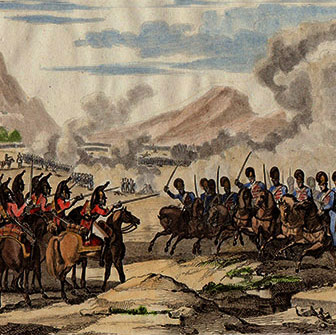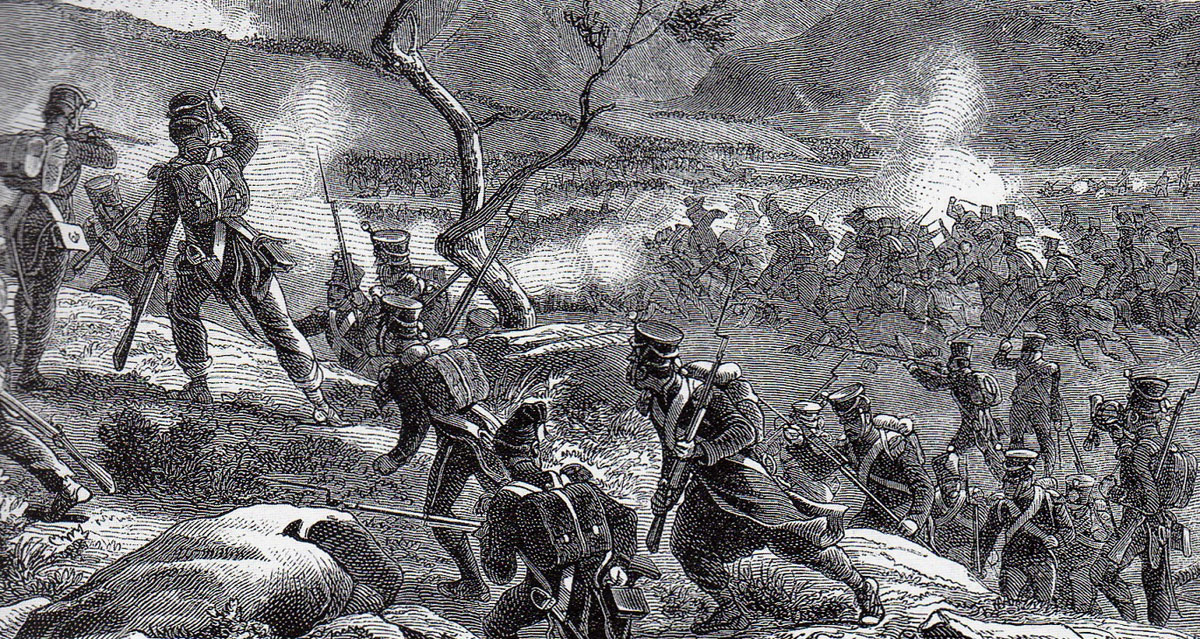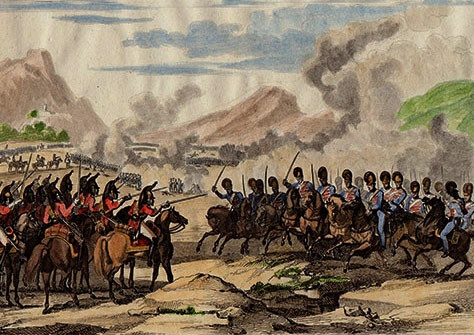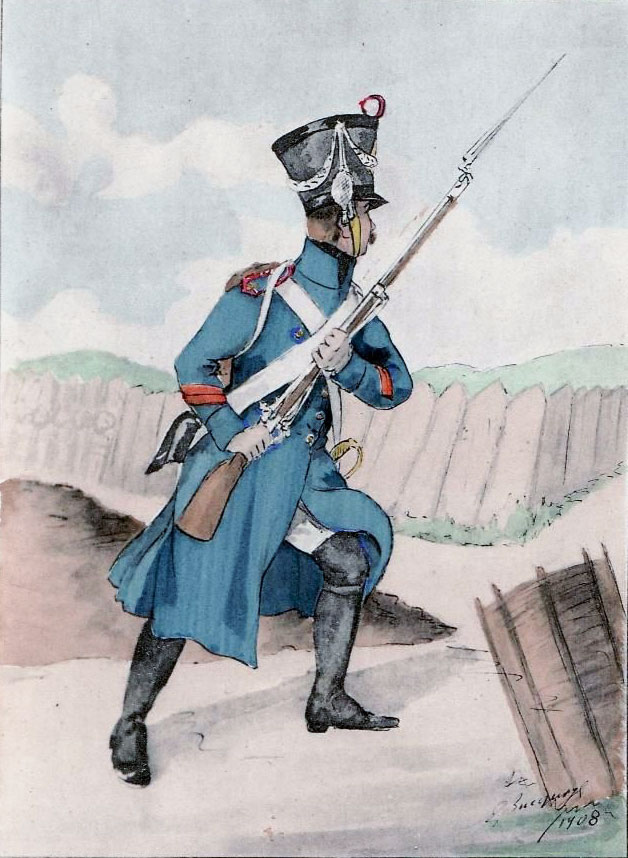The indecisive battle fought on 12th March 1811 in Western Central Portugal during Massena’s retreat from the Lines of Torres Vedras to the River Mondego, following the unsuccessful French attempt to capture Lisbon during the Peninsular War
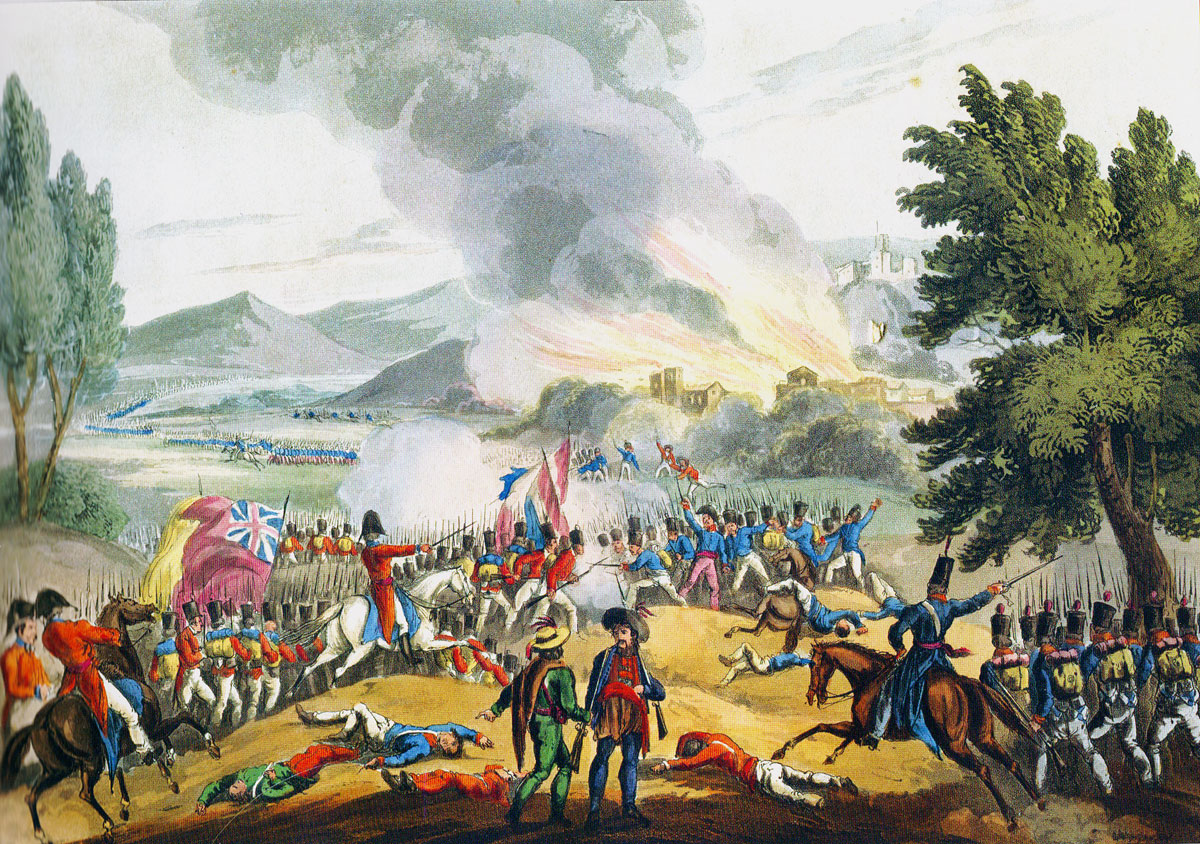
Battle of Redinha or Pombal fought on 12th March 1811 in the Peninsular War: picture by J.J. Jenkins
19. Podcast of the Battle of Redinha or Pombal fought on 12th March 1811 during the Peninsular War: John Mackenzie’s britishbattles.com podcast
The previous battle of the Peninsular War is the Battle of Campo Maior
The next battle of the Peninsular War is the Battle of Sabugal
Battle: Redinha or Pombal
War: Peninsular War
Date of the Battle of Redinha or Pombal: 12th March 1811
Place of the Battle of Redinha or Pombal: Western Central Portugal
Combatants at the Battle of Redinha or Pombal: British and Portuguese against the French.
Commanders at the Battle of Redinha or Pombal: Lieutenant General Viscount Wellington (previously Sir Arthur Wellesley and later the Duke of Wellington) against Marshal André Massena, Prince of Essling and Duke of Rivoli.
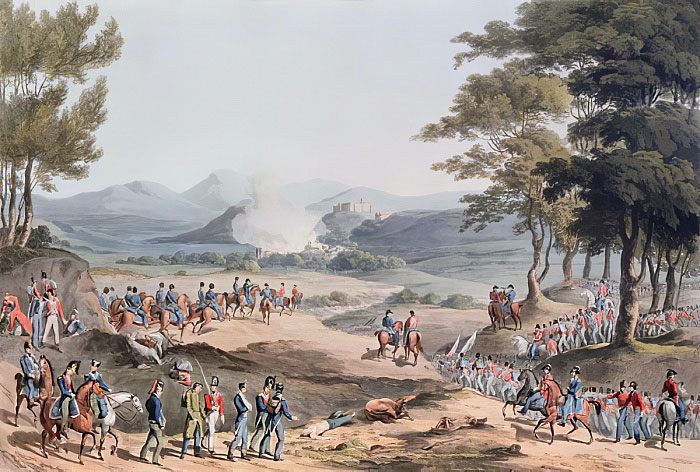
Village of Pombal: Battle of Redinha or Pombal fought on 12th March 1811 in the Peninsular War: picture by Thomas Staunton St Clair
Size of the armies at the Battle of Redinha or Pombal:
Most of Wellington’s 50,000 British and Portuguese troops assembled on the battlefield, where they faced Ney’s Corps of around 10,000 French troops.
Winner of the Battle of Redinha or Pombal:
Redinha was an indecisive action. Ney withdrew in the face of Wellington’s advance and the French resumed their retreat.
Background to the Battle of Redinha or Pombal:
In September 1810, Marshal Massena launched the second French invasion of Portugal.
Wellington fell back before the advancing French army, inflicting a significant defeat on the French at the Battle of Busaco on 27th September 1810, before withdrawing into Lisbon, behind the carefully constructed system of redoubts defending the city, called the Lines of Torres Vedras.
Taken by surprise by the Lines of Torres Vedras, of which he had received no advance warning, Massena remained outside Lisbon, unable to pass the impregnable system of defence, his army dying of starvation and disease, until, on 3rd March 1811, Massena ordered his French army to retreat to the Spanish border.
Massena kept Wellington guessing as to the route he would take, until it became clear that the main part of his army was marching up the west coast of Portugal, along the Atlantic coast road leading to Coimbra, where he intended to cross the River Mondego and head north-east for the Spanish border city of Ciudad Rodrigo.
By 9th March 1811, Massena was at Pombal, with the intention of falling back to Coimbra and crossing the River Mondego, where he would begin his march to the Spanish border along the river.
Massena’s various formations were positioned in the towns and villages around Pombal.
On 11th March 1811, the British Light Division stormed the bridge in Pombal, but was driven back by a counter-attack launched by Ney.
Wellington ordered a fresh attack for the afternoon, but the British Third and Fourth Divisions did not reach Pombal until late in the day and the attack was abandoned.
Also, on the 11th March 1811, the French Genial Montbrun conducted a search for fords across the River Mondego without success, reporting to Massena that Coimbra was held by Trant’s Portuguese Militia.
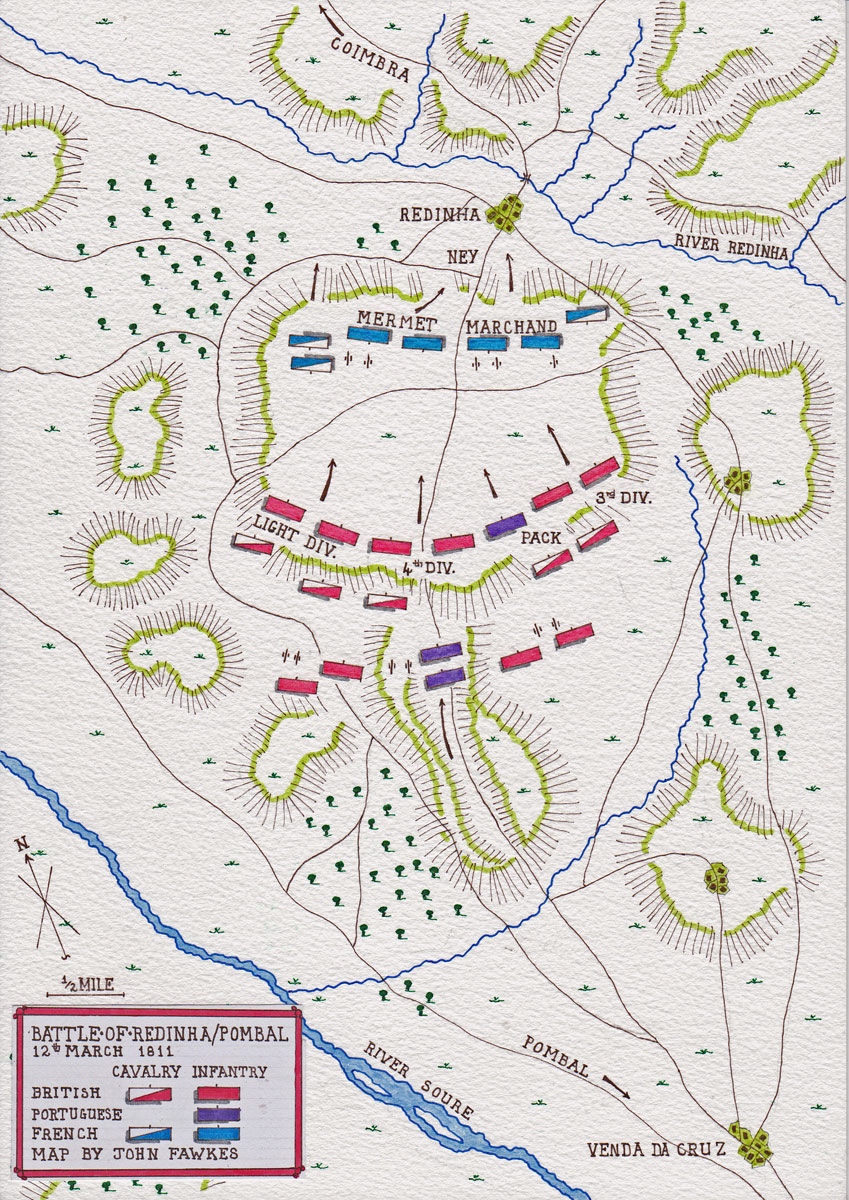
Map of the Battle of Redinha or Pombal fought on 12th March 1811 in the Peninsular War: map by John Fawkes
Account of the Battle of Redinha or Pombal:
Early on 12th March 1811, Ney, commanding the rearmost French troops, left Venda da Cruz and fell back on Redinha.
Ney positioned his two infantry divisions, Mermet’s and Marchand’s, on a plateau to the south of the River Redinha and the town of Redinha, with several regiments of cavalry and 14 guns.
The plateau was approached from the south by a defile which restricted access to the plateau from that direction.
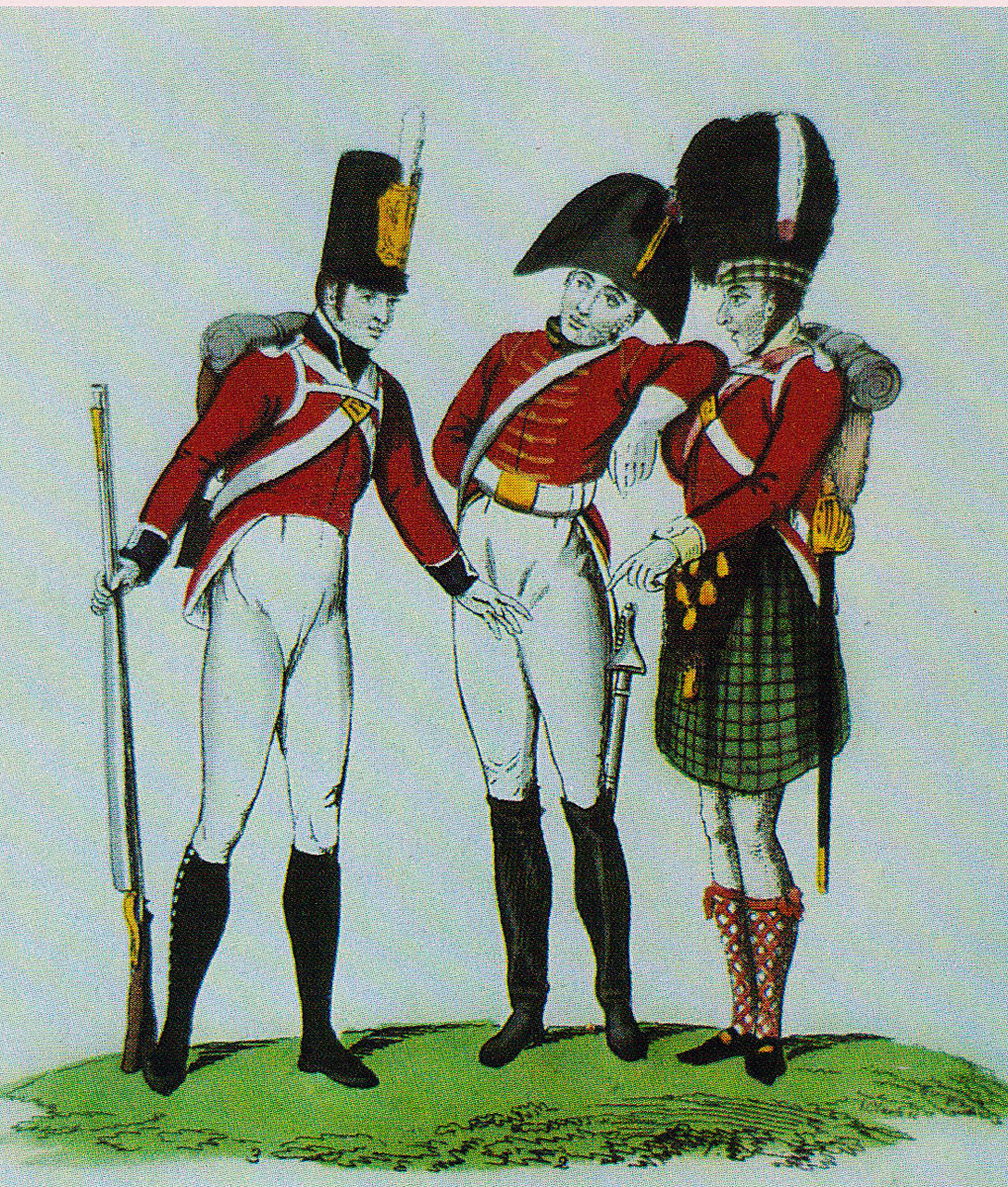
Royal Dragoon with 2 infantrymen: Battle of Redinha or Pombal fought on 12th March 1811 in the Peninsular War
Wellington, his divisions having come up, followed Ney at daybreak, led by an advanced guard of the Royal Dragoons, King’s German Legion 1st Hussars, the Light Division and Pack’s Portuguese Brigade.
The Light Division deployed in front of Ney’s right flank and, driving the French skirmishers back, advanced onto the plateau, where they came under a heavy fire and were charged by the French cavalry.
On the British right, Picton’s division advanced onto the plateau, but was also checked.
In Wellington’s centre, Pack’s Portuguese Brigade did not press its attack.
Wellington, seeing that there appeared to be strong French reserves on the far side of the River Redinha, halted the assault to await the arrival of more British troops.
The British Fourth Division was delayed by the defile, during which time, Ney withdrew Marchand’s Division to the north side of the River Redinha, where it occupied the heights overlooking the town.
Eventually, Wellington formed his line; from the right, Picton’s Third Division, Pack’s Brigade, the Fourth Division with the Light Division on the left.
Wellington’s line outflanked the French troops on the plateau.
The cavalry formed a second line with the rest of the army in reserve.
A signal of three guns fired ordered the British attack.
As the British advanced, the French fired a salvo from their guns and retreated, the infantry to the bridge in Redinha over the river and the cavalry away to the right.
Ney left the order to retreat too late for the movement to be executed easily and it took Mermet’s skill as a commander to extract his division without undue loss.
French artillery fire from the positions above Redinha covered both the bridge in Redinha and the ford below the town, preventing Wellington from pressing his pursuit.
Ney withdrew from his position behind Redinha and took up another on high ground two or three miles further up the road.
Picton attempted to manoeuvre around Ney’s left, but Ney again disengaged his corps and marched away towards Massena’s main body, bringing the battle to a close.
British Casualties at the Battle of Redinha or Pombal:
Total British and Portuguese casualties in the Battle of Redinha were 205 men
killed, wounded or missing.
The French casualties in the Battle of Redinha were 227 men killed, wounded or missing.
Follow-up to the Battle of Redinha or Pombal:
Massena’s preferred route for the French retreat to Spain was via Coimbra and, crossing the River Mondego, to take the route north-east on the north bank of the Mondego.
The French needed 36 hours to construct a bridge over the River Mondego at Coimbra and thereby gain access to the north bank.
Wellington’s close pursuit denied Massena the 36 hours to construct this bridge and forced the French to take the route directly east by Miranda de Corvo, a less satisfactory alternative that led to some narrow escapes for French divisions.
Further heavy fighting took place until the French were enabled to repair the bridge over the River Alva and march away to the Spanish border.
Medal and Battle Honour for the Battle of Redinha or Pombal:
The Battle of Redinha or Pombal is not a British Battle Honour nor a clasp on the British Military General Service Medal 1848.
Anecdotes and traditions from the Battle of Redinha:
- An incident took place at Foz d’Arouce on 15th March 1811, during Ney’s retreat from Miranda de Corvo, in which the French soldiers of Ney’s Corps hamstrung 500 baggage horses and mules to stop them being taken and used by the British and Portuguese. The British soldiers, on encountering these animals in their state of mutilation, were so infuriated that it is surmised that if there had been fighting on the following day no quarter would have been given to the French troops.
References for the Battle of Redinha or Pombal:
See the extensive list of references given at the end of the Peninsular War Index.
The previous battle of the Peninsular War is the Battle of Campo Maior
The next battle of the Peninsular War is the Battle of Sabugal
19. Podcast of the Battle of Redinha or Pombal fought on 12th March 1811 during the Peninsular War: John Mackenzie’s britishbattles.com podcast
